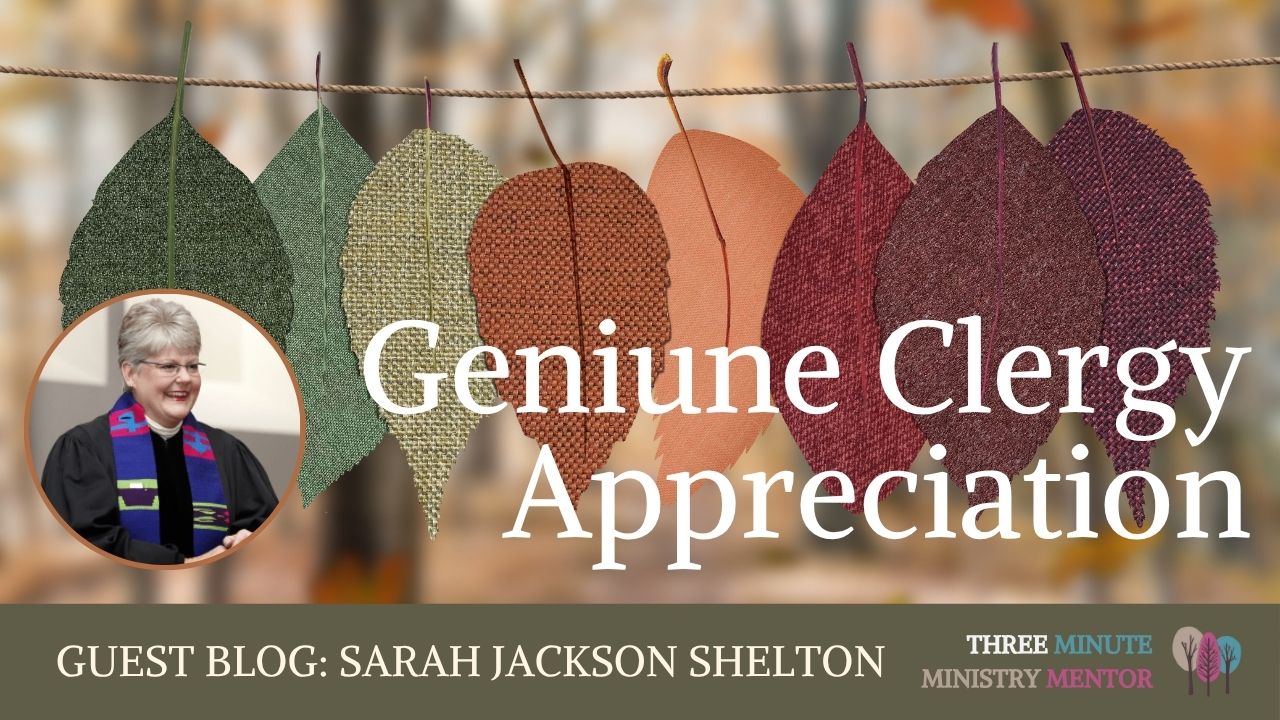Editor’s note: This week we welcome Rev. Sarah Jackson Shelton as our guest. Sarah helps us think about how to offer genuine appreciation for clergy. A retired Baptist preacher with 44 years of ordained ministry, she now serves as Pastor Emeritus of Baptist Church of the Covenant and as a conversationalist for The Center for Healthy Churches. She is the wife of Lloyd, the mother of David and Dannelly (Sarah Margaret), and grandmother to Jane.
Genuine Clergy Appreciation
Appreciation: recognition and enjoyment of the good qualities of someone or something
Ministers are shown appreciation in typical and predictable ways.
…the small check given to every staff member at Christmas by the congregation.
…the occasional gift card to a restaurant.
…the book that will sit in my study gathering dust.
…the flowers in the worship service to honor the pastor’s anniversary.
While each of these is lovely and thoughtful, for me, it is the unexpected, small kindnesses that refuel me for ministry.
…the child who hands you her bulletin at the end of the service. “I drew you while you were preaching! I want to know, can boys be preachers too?”
…the loaf of homemade bread left on your desk just because.
…the Amazon delivery of dark chocolate Milano cookies to your hotel room after an important presentation.
…the Personnel Committee agrees to fund therapy for the staff.
…the Diet Coke and Snickers bar delivered to your house when a parent dies.
…the Monday morning email that tells you specifically how the sermon was helpful, not just “good job” at the back door of the sanctuary.
The Need to Be Appreciated
The female clergy with whom I hold conversations have pointed me to their need to be genuinely appreciated, seen, heard, and validated. My awareness began on a women’s retreat for female clergy just after the pandemic. The Center for Pastoral Excellence (on the campus of Samford University) asked me to lead a small group and guide the conversation around five questions:
What have you lost?
Where does it hurt?
What is keeping you alive?
What gives you hope?
How and what do you dream?
As the group leader, I wasn’t there to “fix” anything or make a referral. I was only present to listen. As I did, several consistent themes arose from the discussions, a few being: no one appreciates me, no one listens to me, no one sees me.
Listening to Clergy
The Center offered an opportunity for me to continue listening. I use Terry Tempest Williams’ definition of a conversation:
“Conversation is the vehicle for change. We test our ideas. We hear our own voice in concert with another. And inside those pauses of listening, we approach new territories of thought. A good argument, call it a discussion, frees us. Words fly out of our mouths like threatened birds. Once released, they may never return. If they do, they have chosen a home and the bird-words are calmed into an ars poetica.” (When Women Were Birds)
Within two weeks of beginning listening sessions, over 35 clergy women just wanted to talk. They represent all denominations and serve all over the United States. Some I knew and others became friends quickly. Most were already in therapy and had coaches. So we engage in conversations about our families, how to balance family life and church family, their children who struggle academically, how to be a pregnant pastor, the books we are reading, challenges at the church, sermon texts, and more. The two statements I make the most are:
Read the church’s Constitution and Bylaws.
It will not always be like this.
There are also times when I sit in silence as the clergy woman cries, without explanation, for the entire hour.
Notes of Encouragement
After each conversation, I take stationery and write a small note of encouragement to the clergy person so that they know they were heard and that someone carries them in thought and prayer who doesn’t have to. There is no “magic” in those notes, but it has been the consistent positive feedback that I receive:
“I carry your notes in a pocket in my book bag. I get them out to read when I am in carpool line.”
Others have said, “I have a basket on my desk where I put every one of your notes. They are readily available for me to read at any time.”
The notes not only include a reference to our conversation, they also contain a small quote from current writers (Steve Garnaas-Holmes, John O’Donahue, Kate Bowler, etc). Here’s an example from Kate Bowler and Jessica Richie:
Blessed are we, the weary
and weak and sore,
with only the merest ember
left burning
but who still whisper,
with all the voice we can muster:
Breathe on me, oh God,
breathe life into my tired body,
my heavy limbs,
bring light to the dark corners
of my mind,
breathe comfort into my sad heart.
Who in your life needs ars poetica (truth in rehearsal)?
Who in your life needs an encouraging conversation?
Which person in your life needs to receive a card of appreciation?
Who needs a candy bar?





Beautiful! Appreciation for the reflection on appreciation!